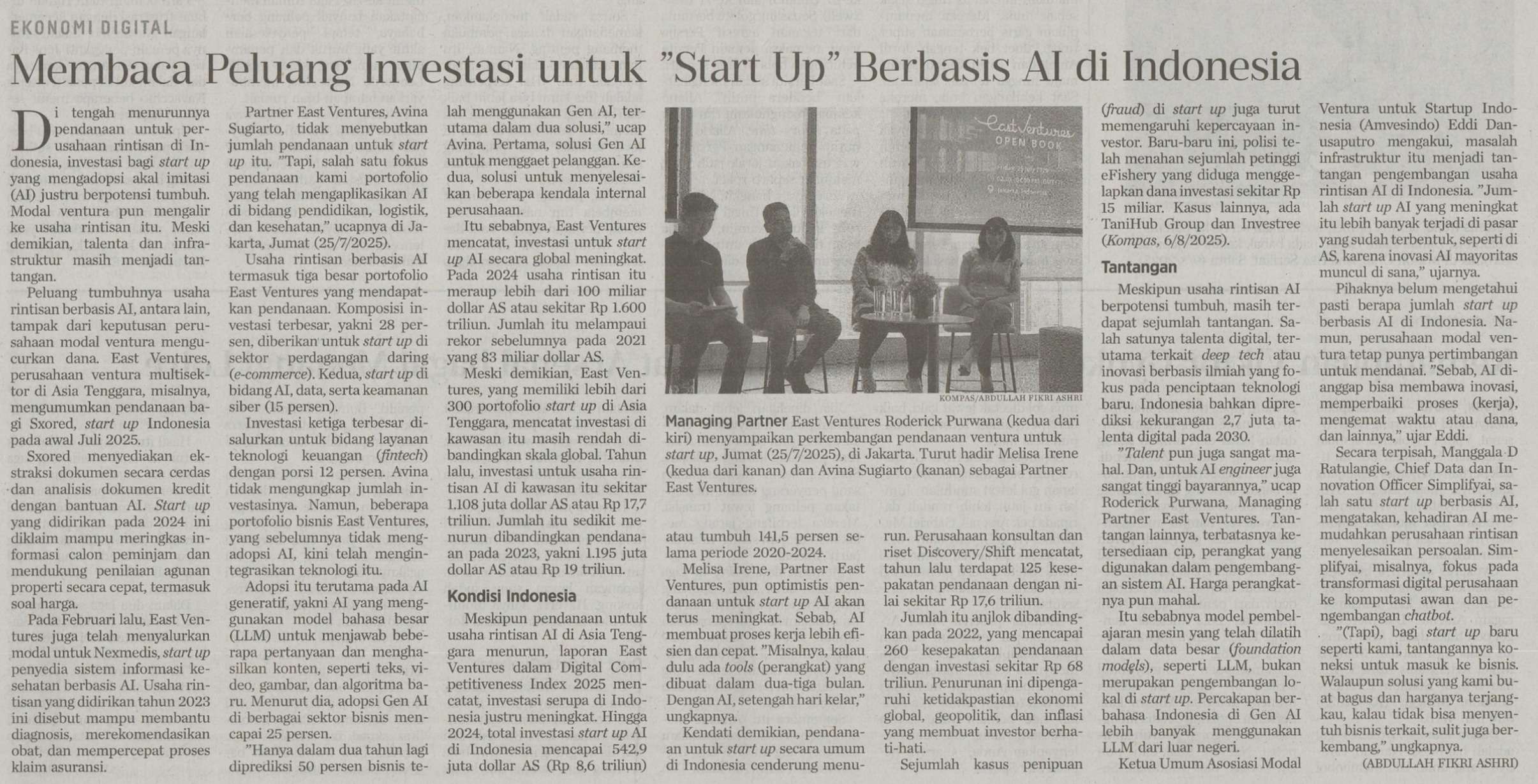Local AI startups in Southeast Asia are increasingly capturing the attention of investors, thanks to their innovative, culturally relevant solutions that create real impact on the ground.
Amid declining funding for startups in Indonesia, investment in startups adopting artificial intelligence (AI) has the potential to grow.
AI is no longer a technology of the future—it has become a vital force shaping today’s industrial landscape.
In Indonesia and across Southeast Asia, AI-driven startups aren’t just pushing boundaries with innovation; they’re also tackling real-world challenges that have long been difficult to address through conventional means.
It’s no surprise, then, that these AI startups are gaining interest from investors and venture capital firms, including East Ventures, which has become increasingly focused on AI-based startups as a key investment priority in the coming years.
In its white paper titled AI-first: Decoding Southeast Asia Trends, East Ventures projects that one in four businesses in the region will begin adopting Generative AI (GenAI) this year.
By 2027, that figure is expected to reach 50%. Moreover, AI is predicted to contribute between 10% to 18% to Indonesia’s GDP by 2030.
However, adopting AI, especially GenAI, isn’t just about following trends. This technology must be used effectively and efficiently to streamline workflows, reduce costs, and scale operations without requiring heavy infrastructure.
It opens up vast opportunities for startups to leap forward—provided they can ground their solutions in real-world needs.
“We believe AI startups have great potential to solve real problems in society. What makes Indonesian startups uniquely strong is their ability to apply AI in ways that are locally relevant,” said Willson Cuaca, Co-Founder and Managing Partner at East Ventures.
According to Willson, East Ventures remains sector-agnostic but is placing particular emphasis on funding AI startups in healthtech, climate tech, and consumer tech.
AI-based startups are among the top three funded by East Ventures. The firm’s latest Sustainability Report states that 28% of its investment in the past year went to startups in the e-commerce sector, making it the largest. Second notes startups in AI, data, and cybersecurity (15%).
Startups that can localize global technologies are seen as having a sustainable competitive edge.
Aaron “Ronnie” Chatterji, Ph.D., Chief Economist at OpenAI, also emphasized that the greatest opportunities in AI don’t lie in the core technology itself.
While much of the spotlight is on OpenAI and foundational model developers, the most significant opportunities lie downstream, in how AI is applied across specific sectors such as fintech, healthcare, education, energy, and retail.
“These personalized solutions will become the foundation for many of tomorrow’s most successful companies,” Ronnie explained.
One clear example is Nexmedis, a healthcare startup that has revolutionized hospital information systems through its AI-powered platform, cutting down administrative tasks by up to 90%.
Their technology enables rapid diagnostics within seconds—even in remote areas—across more than 80 districts and cities, 85% of which are in underserved regions. With this system, doctors can focus more on treating patients rather than dealing with paperwork.
In a country like Indonesia, where access to medical professionals is unevenly distributed, innovations like this are especially critical.
AI in fraud detection
East Ventures also recently invested in Sxored, a credit analytics startup offering AI-based solutions for automatically extracting, reading, and analyzing credit documents.
Sxored’s AI assistant generates borrower summaries and supports rapid property collateral assessments, including market value estimates and mapping of surrounding assets, while ensuring secure, encrypted data handling.
These features significantly streamline the collateral assessment process, improve fraud detection accuracy through automation, and enhance overall decision-making efficiency. As a result, institutions benefit from lower costs, better accuracy, and greater scalability.
Cyrill James Hardie, CEO of Sxored, described the technology as a replacement for the manual, error-prone task of reviewing thousands of documents, traditionally a time-consuming process.
“With our system, banks, fintechs, even venture capitalists and auditors can perform underwriting faster, detect fraud more accurately, and serve more clients with reduced risk,” he explained.
This shift toward locally developed AI solutions hasn’t happened overnight. Investors are beginning to recognize that truly effective AI is contextual; AI that understands the local language, culture, behaviour, and user habits.
In the education sector, AI is also making a tangible impact. Ruangguru, an Indonesian edtech platform, integrates self-learning tools, live teaching, AI-powered features, and hybrid learning centres across more than 120 cities.
This technology enables personalized and efficient learning, reaching over 45 million users across Southeast Asia, 75% of whom live outside major urban areas. In this case, AI is not replacing teachers, but rather extending their reach to underserved regions.
According to Ronnie, generative AI can offer need-based tutoring, adaptive content, and services tailored to Indonesia’s rich linguistic and cultural diversity.
Another example is GENEXYZ, a startup developing metahuman AI-powered virtual influencers. These digital figures aren’t just brand mascots; they can deliver messages in a personal and culturally relevant way tailored to local audiences.
In the creative tech space, GENEXYZ offers a platform that allows brands to create digital personas capable of engaging with audiences on a personal and measurable level.
Their platform enables brands to leverage metahuman technology to build consistent, scalable interactions and connect with Southeast Asian markets through immersive, culturally nuanced approaches.
“This approach brings a level of scale and consistency that traditional digital marketing has never achieved. All of our virtual influencer characters are developed in-house using top-tier technology and talent,” said Belinda Luis, Co-Founder & CEO of GENEXYZ.
A similar innovation can be seen in bythen, a startup that lets users create their own AI-powered digital twins. These avatars can be used to generate creative content, livestream, and even build a personal digital brand.
It’s a timely solution for the growing creator economy, where the line between the physical and virtual worlds is becoming increasingly blurred.
How it’s looking for Indonesia
Global investments in AI startups are increasing exponentially. In 2024, these startups have raised over US$100 billion, or around Rp1,600 trillion.
Yet, investments in Southeast Asia’s AI scene remain low compared to the global scale. Last year, investment in AI startups in the region only made up around US$1,108 million (Rp17.7 trillion).
Though it slightly decreased from 2023, “We are confident that investment in AI startups will grow even further. From East Ventures’ perspective, we see many partners and our portfolio implementing AI.”
Despite declining funding for AI startups in Southeast Asia, the East Ventures – Digital Competitiveness Index 2025 report notes that similar investment in Indonesia is actually increasing. Until 2024, total investment in AI startups in Indonesia has reached US$542.9 million (Rp 8.6 trillion), representing a 141.5% growth from 2020 to 2024.
Melisa Irene, Partner at East Ventures, is also optimistic that funding for AI startups will continue to increase. This is because AI makes work processes more efficient and faster. “For example, previously, it took us two to three months to create the tools. With AI, they can be completed in half a day,” she said.
Startup founders can also experiment extensively with AI. Furthermore, with a population of around 280 million, Indonesia boasts high internet penetration, at around 80%; a whopping potential for AI startup growth.
This article is a summary of two articles. Read the original articles in Bisnis Indonesia paper, Saturday, 2 August 2025 edition, and Kompas Indonesia, 10 August 2025.
Download the AI-first: Decoding Southeast Asia trends white paper here.







